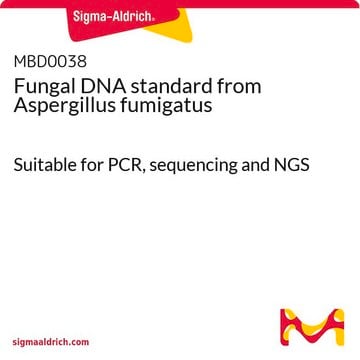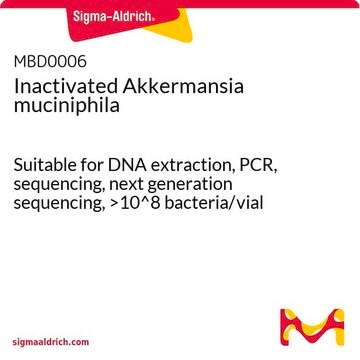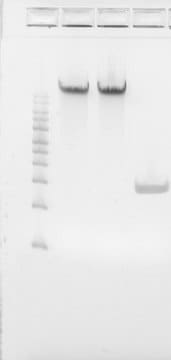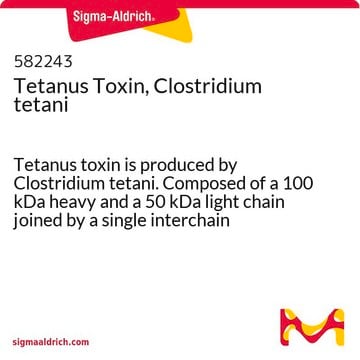MBD0036
Microbial DNA standard from Vibrio harveyi
Suitable for PCR, sequencing and NGS
Iniciar sesiónpara Ver la Fijación de precios por contrato y de la organización
About This Item
Código UNSPSC:
41105500
NACRES:
NA.51
Productos recomendados
Nivel de calidad
formulario
liquid
composición
, 10 ng/μL
técnicas
FISH: suitable
Condiciones de envío
ambient
temp. de almacenamiento
−20°C
Descripción general
Standardization of sample analysis is currently needed in microbiome genomics research workflow. Lack of standardization can lead to biases and errors in common processes during sample preparation and analysis such as sample amplification, sequencing and bioinformatics analyses.1 Vibrio Harveyi genomic DNA microbial standard can serve as standard for benchmarking the performance along the workflow of microbiomics or meta-genomics analyses and as a tool to increase reproducibility and allow comparison of results obtained by different labs.
Since V. Harveyi is not a typical resident of the human microbiota it can serve as a spike-in standard in human microbiota genomics workflow analysis.
V. harveyi is a gram negative, rod-shaped, motile, heterotrophic marine luminous pathogen bacterium that widely inhabits natural aquatic environments. It belongs to the family Vibrionaceae of class Gammaproteobacteria 2, known as a serious bacterial pathogen of marine fish and invertebrates, including penaeid shrimp in aquaculture 2,3.
V. harveyi has the ability to regulate gene expression by quorum sensing. Current research 4,5,6 demonstrates 3 regulatory molecules that mediate quorum sensing in in V. harveyi; homoserine lactone (HAI-1) , a furanosyl borate diester (AI-2) and cholerae autoinducer 1 (CAI-1). The quorum sensing pathway that regulates bioluminescence, biofilm formation and other virulence factors in V. harveyi is very similar to the pathway that regulates virulence factor expression in Vibrio cholerae, 7, 8 making V. harveyi an important model system for human health research.
Since V. Harveyi is not a typical resident of the human microbiota it can serve as a spike-in standard in human microbiota genomics workflow analysis.
V. harveyi is a gram negative, rod-shaped, motile, heterotrophic marine luminous pathogen bacterium that widely inhabits natural aquatic environments. It belongs to the family Vibrionaceae of class Gammaproteobacteria 2, known as a serious bacterial pathogen of marine fish and invertebrates, including penaeid shrimp in aquaculture 2,3.
V. harveyi has the ability to regulate gene expression by quorum sensing. Current research 4,5,6 demonstrates 3 regulatory molecules that mediate quorum sensing in in V. harveyi; homoserine lactone (HAI-1) , a furanosyl borate diester (AI-2) and cholerae autoinducer 1 (CAI-1). The quorum sensing pathway that regulates bioluminescence, biofilm formation and other virulence factors in V. harveyi is very similar to the pathway that regulates virulence factor expression in Vibrio cholerae, 7, 8 making V. harveyi an important model system for human health research.
Aplicación
Suitable as a standard for PCR, Sanger and next generation sequencing (NGS).
Características y beneficios
- Individual microbial standard for microbiomics and meta-genomics workflow
- Suitable standard for PCR, Sanger sequencing and 18S NGS
- Improves bioinformatics analyses
- Increases reproducibility and repeatability
- Identity and purity of the genomic V. harveyi DNA has been confirmed by 18S NGS and gel electrophoresis
Forma física
The genomic DNA is provided in at ≥10 ng/μl concentration in TE buffer pH 8.0.
Otras notas
It is recommended to avoid freeze thaw cycles of this product
Código de clase de almacenamiento
12 - Non Combustible Liquids
Clase de riesgo para el agua (WGK)
WGK 1
Certificados de análisis (COA)
Busque Certificados de análisis (COA) introduciendo el número de lote del producto. Los números de lote se encuentran en la etiqueta del producto después de las palabras «Lot» o «Batch»
¿Ya tiene este producto?
Encuentre la documentación para los productos que ha comprado recientemente en la Biblioteca de documentos.
Artículos
DNA standards enhance metagenomics research integrity, offering precise species study and mixed community standards.
Nuestro equipo de científicos tiene experiencia en todas las áreas de investigación: Ciencias de la vida, Ciencia de los materiales, Síntesis química, Cromatografía, Analítica y muchas otras.
Póngase en contacto con el Servicio técnico








